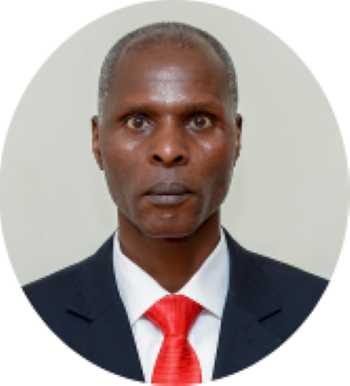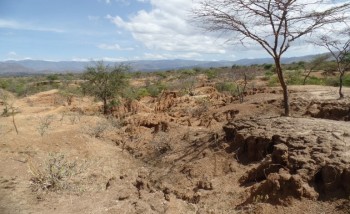Land degradation is one among the many challenges affecting smallholder farmers in drylands areas in Kenya including Chepareria Ward in West Pokot County. The drylands farmer research network (FRN) project, is funded by McKnight Foundation through University of Eldoret to support rehabilitation of these degraded landscapes for a period of 8 years (2014-2022). This includes Inception Phase I – 18 months (November 2014 – April 2016), Implementation Phase II – 3 years (November 2016 – October 2019) and Intensification and up/out-scaling III – 3 years (November 2019 – October 2022).
The project PI Prof. Wilson Ngétich is working with co-researchers Dr. Syphyline Kebeney, (Soil & Water Conservation), Dr. Ruth Njoroge, (Soil Fertility and Nutrition), Dr. Fred Wamalwa, (Social Scientist), Mr. Harrison Churu (Soil Biology and PhD student) and Mr. Alkamoi Bonface (Seed Scientist and PhD student) all from the University of Eldoret.
The overall objective of the project is to strengthen farmer lead rehabilitation of degraded lands to improve sustainable production of multi-purpose and drought resilient food, fodder and tree production in West Pokot county. Specific Objectives include:
- To establish and strengthen effective collaboration in rehabilitating degraded lands, scaling up interventions and influencing development of supportive policies.
- To strengthen participatory trial research to identify, evaluate, select and promote the production of suitable crops, trees and fodder that works best for men, women and youth.
- To establish and strengthen community based AE income generating activities that works for men, women and youth and
- To establish new, evaluate the performance and upscale context specific soil and water conservation measures that works best in managing soil health in West Pokot County.
The output of the project to date includes the following which has impacted greatly on the community:
- SWC structures:
22 sand dams constructed
Over 25 Km of terraces built
Ban on sand harvesting – local by-laws within project area developed - Crop diversity trials:
21 crop varieties tested and important selected trailed for community based seed system
3 Fodder grasses introduced, tested and adopted
Signs of Improved food and nutrition security evident in project area - Tree Nursery:
Setting up 3 community tree nursery producing assorted exotic and indigenous agroforestry, fruits and fodder trees for the community.
Several fruit and agroforestry trees raised and shared among farmers
Proactivity in using live fences for enclosures - Poultry project:
Hatchery with capacity of 2112 chicks
Improved and local Kienyeji chicken have been hatched and sold to farmers. - Studentship:
Seven students have been sponsored on a full scholarship by the project to pursue Msc. and Ph.D. degrees in Soil and Land use management (4), Seed science (1) and Agricultural Extension and Rural Development (2). Two students graduated in 2019 (MSc Agric. Extension) while the rest are ongoing. - Social:
Enhanced collaboration and networking between and among farmers and partners
Improved community identity and recognition in SWC intervention- attracting attention of more potential partners
Capacity strengthening- Enhanced group and individual skills in trained aspects
Building trust, equity, inclusivity and dignity
The project has impacted greatly on over 10 villages in including Senetwo, Korellach and Chepturnguny, Chepareria with a total household estimated at 1,200 and a population of 7,000. The number of households directly involved in the project is 380 while the number of people indirectly influenced by the project is over 3,000.


